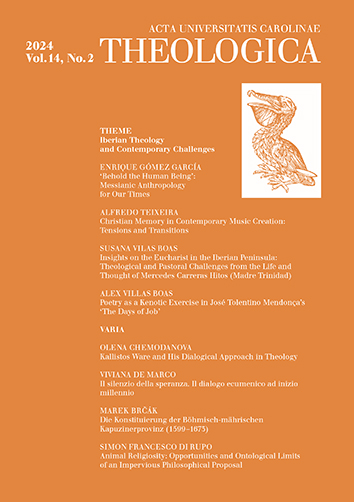AUC Theologica is a peer-reviewed journal for theology published twice a year. As we publish original papers in English, German, French, and Italian, our mission is to serve as a platform both for Czech researchers, who can present their research results in these languages, and for international contributors, who are invited to enter the academic theological discussion in the heart of Europe.
The journal focuses on a wide range of theological disciplines, such as systematic theology, biblical studies, patristic studies, pastoral and spiritual theology, religious education, church history, etc. Within these fields, the journal seeks to reflect the current theological questions and problems, which often requires interdisciplinary approaches. Supporting the intersection of various theological disciplines, we thus also welcome theological papers touching other academic fields including philosophy, sociology, literary studies, and science.
Each issue consists of two sections. The thematic section presents papers of the same focus. The section called ‘Varia’ invites papers dealing with various theological themes from the perspective of all Christian traditions. Our current and past issues are approachable for free on this website in the form of Open Access.
AUC THEOLOGICA, Vol 14 No 2 (2024), 131–149
Die Konstituierung der Böhmisch-mährischen Kapuzinerprovinz (1599–1673)
[The Formation of Bohemian-Moravian Capuchin Province, 1599–1673]
Marek Brčák
DOI: https://doi.org/10.14712/23363398.2025.8
published online: 12. 09. 2025
abstract
This study investigates the context of establishment of Bohemian- Moravian Capuchin province in 1673. It separated from the previously existing Bohemian-Austrian province, which thus split in two: a Bohemian-Moravian province with a seat in Prague and an Austrian province with a centre in Vienna. In the process of dividing the Bohemian-Austrian province, which was one of the largest ones worldwide in terms of both convents (38) and friars living in them (808), the criterion of land units had in the end prevailed. The division of the province was achieved only after many years of effort because it had to overcome a sustained reluctance of the order’s headquarters in Rome. Like in the case of other Central European provinces, the headquarters were opposed to the formation of new provinces because the Italian Capuchins did not want to lose the decisive majority they had since the order’s foundation. Between their arrival in 1599 and the year 1673, the Capuchins had founded in the Czech Lands 21 monasteries, in which there lived 401 friars. This text analyses the main reasons for Capuchin’s success in this region, which was achieved despite the catastrophic impact of the Thirty Years’ War. It turns out that the support they had received from the ruling Habsburgs was of crucial importance. The establishment of the order in this region required efforts on several fronts: aside from attracting new members, it was also necessary to adjust the monastic life to the religious needs and climatic conditions in the Czech Lands.
keywords: Capuchins; Monastic history; Czech Lands; 17th century

Die Konstituierung der Böhmisch-mährischen Kapuzinerprovinz (1599–1673) is licensed under a Creative Commons Attribution 4.0 International License.
148 x 210 mm
periodicity: 2 x per year
print price: 100 czk
ISSN: 1804-5588
E-ISSN: 2336-3398
